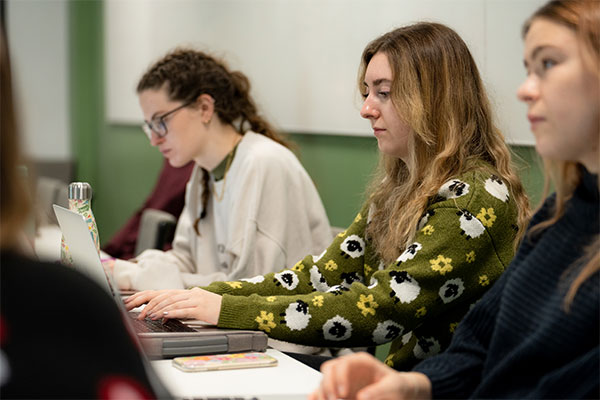View semester dates

BA (Hons) Criminology and Social Psychology
Understand how crime and the individual are shaped by social environments
Year of entry: 2026/27
View semester dates
Explore crime and selfhood in changing social contexts whilst tackling injustice and inequality.
Why choose Criminology and Social Psychology at York?
Look beyond traditional views of crime and what it means in our culture and society. Engage with the latest criminological thinking and reconsider dominant ideas surrounding crime and disorder. You'll uncover how society, culture and interactions with other people influence our identities, choices and actions.
Benefit from teaching that's research-led and covers real world issues. You'll develop new ways of thinking about the effects of crime and social psychology, how it impacts our lives and how we can respond to it. In the process, you'll learn to think critically, evaluate evidence and craft convincing arguments.
Develop and nurture criminological and social psychology specialisms. As you progress, you'll develop proficiencies in different areas of studying crime and the self. Our range of option modules will allow you to tailor your learning to your emerging expertise.
Prepare for your future. During your studies, you'll have access to careers support, events and networking opportunities. You'll also have the option of adding a placement year or year abroad to your degree. This allows you to gain invaluable experience working or studying in another country before you graduate
8th in the UK for Criminology
1st in the UK for Sociology research impact
5th in the UK for Graduate Prospects in Criminology
Course content
Our teaching is led by our research and covers real-world issues. You'll engage with key aspects of crime and social psychology. You'll explore how different approaches have been used to explain the self and rule breaking. In the process, you'll learn how to think critically, craft arguments and become a creative thinker.
As you progress you'll focus your studies, choosing option modules to develop your expertise. In your final year you'll undertake independent research drawing on your expertise in criminology and social psychology through a dissertation.
- Year 1 - six core modules
- Year 2 - five core modules and one option module
- Year 3 - two core modules, including a 40-credit dissertation, and three option modules
Year 1
You'll be introduced to the foundations of criminology and social psychology, as well as the skills you need to understand the social world through your modules.
Core modules
- Becoming a Social Researcher
- Cultivating a Sociological Imagination
- Explaining Crime and Deviance
- Investigating Social Problems
- Theorising the Social World
- Understanding Self in Society
Academic integrity module
In addition to the above you will also need to complete our online Academic Integrity module.
Year 2
Core modules
- Understanding Contemporary Crime
- Critical Transformations of Social Psychology
- Doing Research
- Creative Alternatives in Social Psychology
- Crime, Control and Globalisation
Option modules
You will study one option module. Examples can be found below. The options available to you will be confirmed after you begin your course.
- Social Interaction and Conversation Analysis
- People and the State
- Cities and Urban Culture
- Humans and Other Animals
Elective modules
You may be able to replace one option module with an elective module, studying a complementary subject, a language or an interdisciplinary topic.
Year 3
Core modules
Option modules
You will also study two option modules. Examples can be found below. Some option module combinations may not be possible. The options available to you will be confirmed after you begin your course.
- Race and Injustice
- Crime, Media and Culture
- Social Interaction and Conversation Analysis (If not taken in Year 2)
- Humans and Other Animals (If not taken in Year 2)
- Talk at Work
- Morbidity, Culture and Corpses
- Spiritual Realities
- Crime, Gender and Sexuality
- Working in the Criminal Justice System
Elective modules
You may be able to replace one option module with an elective module, studying a complementary subject, a language or an interdisciplinary topic.
Our modules may change to reflect the latest academic thinking and expertise of our staff, and in line with Department/School academic planning.
Learning outcomes
Every course at York has been designed to provide clear and ambitious learning outcomes. These learning outcomes give you an understanding of what you will be able to do at the end of the course. We develop each course by designing modules that grow your abilities towards the learning outcomes and help you to explain what you can offer to employers. Find out more about our approach to teaching and learning.
Learning outcomes for this course
- Confront and analyse real-world social and crime related problems via criminological and social psychological debates by effectively and systematically challenging commonly held assumptions.
- Develop, evaluate and refine complex and critical arguments and evidence-based claims on social issues, cultural trends and offending behaviour, drawing on criminological and social psychological theories and approaches.
- Critically synthesise and communicate complex information and arguments about emerging crime and social issues in appropriate formats and a range of media and digital technologies.
- Work efficiently, effectively and creatively, both independently and as part of a team, in a manner which is respectful of diverse views, values and the cultural perspectives.
- Design and undertake ethical research which draw upon appropriate qualitative and/or quantitative skills to produce empirically rigorous analysis of social issues.
- Identify and plan future learning requirements by recording, reflecting on and evaluating personal learning and development, towards a range of future careers.

Studying criminology has challenged me to think critically about these issues and push for meaningful change, making it a subject that’s relevant to everyone in society. Modules like Working in the Criminal Justice System were particularly valuable, as they offered practical insight into what a career in the criminological field might look like.
Isha, BA Criminology
Fees and funding
The fees and funding information here is for students starting in the 2026/27 academic year.
If you take a year abroad or year in industry you'll pay a reduced rate of fees for that year.
Annual tuition fees
| UK (home) | International and EU |
|---|---|
| £9,535 (TBC) | £26,900 |
The UK government has announced its intention to increase tuition fees from £9,535 to £9,790 for the 2026/27 academic year. We expect this to apply to new UK (home) undergraduate students starting their studies in September 2026.
UK (home) or international fees?
The level of fee that you will be asked to pay depends on whether you're classed as a UK (home) or international student. Check your fee status.
Fees for subsequent years
- UK (home) fees may increase within the government fee cap in subsequent academic years. We will notify you of any increase as soon as we can.
- International fees are subject to increase in subsequent years in line with the prevailing Consumer Price Index (CPI) inflation rate (up to a maximum of 10%).
More information
For more information about tuition fees, any reduced fees for study abroad and work placement years, scholarships, tuition fee loans, maintenance loans and living costs see undergraduate fees and funding.
Funding
We'll confirm more funding opportunities for students joining us in 2026/27 throughout the year.
York, Oxford, Cambridge, Imperial
Just four UK universities are rated Gold for teaching and top ten for research* in the latest national assessment exercises.
* Awarded joint 10th in the Times Higher Education ranking of the Research Excellence Framework 2021.
Teaching and assessment
You’ll study and learn with academics who are active researchers, experts in their field and have a passion for their subjects. Our approach to teaching will provide you with the knowledge, opportunities, and support you need to grow and succeed in a global workplace. Find out more about our approach to teaching and learning.
Teaching format
Our courses consist of a mixture of classroom-based lectures, seminars, and supervisor meetings.
Our research-informed curriculum will provide you with the ability to think critically, develop effective solutions to various work-based problems, and work both independently and as part of a team.
You’ll be taught in a range of specialist subject areas, allowing you to delve deeply into complex topics, explore a whole spectrum of social issues, and develop a resilient, adaptable and challenging mindset that will aid you both within, and beyond, your study.
In the UK, full-time students are expected to spend 1,200 hours a year learning. That's about 40 hours of classes and independent study each week during semesters. Everyone learns at a different rate, so the number of hours you spend on independent study will be different to other students on your course.
Teaching location
You will be based in the Department of Sociology on Campus East. Most of your teaching will take place at various locations across Campus East.
About our campus
Our beautiful green campus offers a student-friendly setting in which to live and study, within easy reach of the action in the city centre. It's easy to get around - everything is within walking or pedalling distance, or you can use the fast and frequent bus service. Take a campus tour.
Assessment and feedback
As you progress, you'll complete a range of assessments designed to help you develop the skills needed to be an effective scholar. Your assessments will be varied, ranging from essays and reports to observational exercises, podcasts and even visual analysis and communication skills workshop design. What assessments you complete will depend on what modules you take.
You’ll submit summative work, which counts towards your final degree score, and formative work, which doesn’t count towards your final grade but gives you the chance to practice techniques and identify areas to improve. We’ll provide detailed feedback on the work you submit, supporting you to develop your academic skills.
Careers and skills
Criminology at York is ranked 9th in the UK for Graduate Prospects according to the Times Good University Guide, 2026. We’ll help you focus your career goals, gain valuable experience, and meet the right employers. You’ll also have the opportunity to undergo internships, take part in volunteering, and even pursue a year away from York, either as a placement year or studying abroad.
By the time you finish your course, you’ll have a whole host of skills, experience and contacts that will prove invaluable in any workplace.
Career opportunities
- Police officer
- Prison officer
- Teacher
- Research and evaluation analyst
- Support worker
- Case manager
- Admin officer
- Wellbeing practitioner
Transferable skills
- Problem-solving
- Evaluating evidence
- Forming reasoned arguments
- Thinking creatively
- Considering different viewpoints
Entry requirements
| Qualification | Typical offer |
|---|---|
| A levels | ABB |
| Access to Higher Education Diploma | 30 credits at Distinction and 15 credits at Merit or higher |
| BTEC National Extended Diploma | DDM |
| European Baccalaureate | An overall average of 75% |
| International Baccalaureate | 34 points overall |
| T levels | Distinction overall T Level subjects in Accounting; Design and Development for Engineering and Manufacturing; Design, Surveying and Planning for Construction; Digital Business Services; Digital Production, Design and Development; Digital Support and Services; Engineering, Manufacturing, Processing and Control; Finance; Health; Healthcare Science; Legal Services; Maintenance, Installation and Repair for Engineering and Manufacturing; Management and Administration; Marketing; Science |
| Scottish Highers / Advanced Highers | Scottish Highers - ABBBB Advanced Highers - not required for entry We may also be able to consider three Advanced Highers or a combination of Highers and Advanced Highers, where an applicant does not meet the grade requirement through Highers alone. Please contact us to discuss your qualifications. |
| International foundation programme | Foundation Certificate from our International Pathway College or an appropriate alternative. |
| Other international qualifications | Equivalent qualifications from your country |
Alternative offers
Meeting the following additional criteria may qualify you for an alternative offer.
| Criteria | Adjustment |
|---|---|
| Widening participation | BBC This is conditional upon successful completion of the WP programme including the YorJourney module (Black Access Programme, Next Step York) or successful completion of Realising Opportunities More about widening participation. |
| Contextual offer | BBB |
| EPQ | If you achieve C or higher in the EPQ, you may be eligible for an alternative offer up to one A level grade (or equivalent) below our typical offer. |
| Core Maths | If you achieve B or higher in Core Maths, you may be eligible for an alternative offer up to one A level grade (or equivalent) below our typical offer. |
| MOOCs | If you successfully complete our online course Imagining York: Discovering the everyday , you may be eligible for an alternative offer up to one A level grade (or equivalent) below our typical offer. Details about how to evidence completion of the MOOC will be sent in your offer letter. Please note: you do not need to pay for the certificate. More about MOOCs. |
English language
If English isn't your first language you may need to provide evidence of your English language ability. We accept the following qualifications:
| Qualification | Minimum requirement |
|---|---|
| IELTS (Academic) | 6.5, with a minimum of 6.0 in each component |
| IB English | A score of 4 in English A or 5 in English B (Higher Level or Standard Level) |
| Cambridge CEFR | 176, with a minimum of 169 in each component |
| Oxford ELLT | 7, with a minimum of 6 in each component |
| Oxford Test of English Advanced | 136, with a minimum of 126 in each component |
| Duolingo | Integrated subscores: 120 overall, with a minimum of 105 in each component |
| GCSE/IGCSE/O level English Language (as a first or second language) | Grade C / Grade 4 |
| LanguageCert SELT | B2 with a minimum score of 33/50 in each component |
| LanguageCert Academic | B2 with a minimum score of 33/50 in each component |
| Kaplan Test of English Language | 478 Main Flight score with 444 in each component |
| Skills for English | B2: Merit overall, with Pass with Merit in each component |
| PTE Academic | 61, with a minimum of 55 in each component |
| TOEFL | 87 overall, with a minimum of 21 in each component (taken before January 2026) 4.5 with 5 in Listening and 4.5 in each other component (taken after January 2026) |
| Trinity ISE III | Merit in all components |
| Other English language qualifications | We also accept other English Language qualifications, including various school-leaving certificates. |
For more information see our undergraduate English language requirements.
If you haven't met our English language requirements
You may be eligible for one of our pre-sessional English language courses. These courses will provide you with the level of English needed to meet the conditions of your offer.
The length of course you need to take depends on your current English language test scores and how much you need to improve to reach our English language requirements.
After you've accepted your offer to study at York, we'll confirm which pre-sessional course you should apply to via You@York.
Next steps
Discover York









